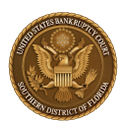(A) Payment From Conventional Filers (And Other Filers Exempted or Suspended from Credit Card Payment). Fees or other charges to be paid to the clerk, and any deposits to be deposited with the clerk, must be tendered in one of the following forms:
(1) U.S. legal currency (cash may not be remitted by mail);
(2) check, cashier’s check or money order in U.S. funds made payable to “Clerk, United States Court”. Only checks drawn on attorney’s trust or operating account (unless the maker is a debtor in a bankruptcy case), on an account of the trustee appointed to the case for which the payment is remitted, or on any United States, state or local government account, will be accepted for payment of filing fees. The clerk will accept a personal or business check for payment of copy, certification or research fees, and fees for compact discs of court proceedings upon presentation of an official government issued photo identification card of the person who is presenting the check. The clerk reserves the right to rescind or amend this policy of acceptance of personal checks without further notice. Payments must be remitted in the exact amount due for the fee owed. No change will be provided for cash, money order, check or other payment remittances.
(B) Payments From Registered Users of CM/ECF.
(1) Payment by Credit Card Required. Registered users (other than case trustees, government agencies and other entities which are specifically exempted by the court or registered users with suspended accounts) must use the CM/ECF credit card module to pay fees and make other required deposits for documents filed in CM/ECF.
(2) Payment Deadline. Sanctions. The registered user must pay any and all fees for CM/ECF transactions on the date filed. Failing to do so will cause the registered user’s electronic filing privileges to be suspended and may result in a bankruptcy petition being dismissed, a document being stricken or sanctions being imposed.
(C) NSF Checks. If any check is returned for insufficient funds or other valid reason by the depository upon which drawn, a returned check fee will be assessed and the clerk may thereafter require cash, cashier’s check, or money order from the payor.
(D) Payment Errors.
(1) Overpayment of Fees. Overpayments of fees of $25.00 or less will not be refunded by the court. Refunds of overpayments in excess of $25.00 must be requested in writing within 30 days.
(2) Credit Card Payment Errors. Filing fees paid in error via credit card will only be refunded upon motion and order of the court except when a filing fee is an unintended duplicate payment caused by an error in the court’s CM/ECF system or Internet credit card program. Refunds will be processed through the electronic credit card system. Refund checks will not be issued.
[Comment: See Local Rule 7067-1 (registry funds).]
